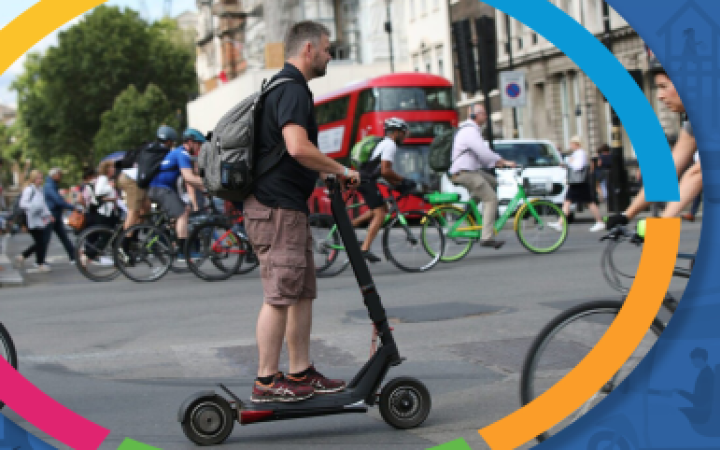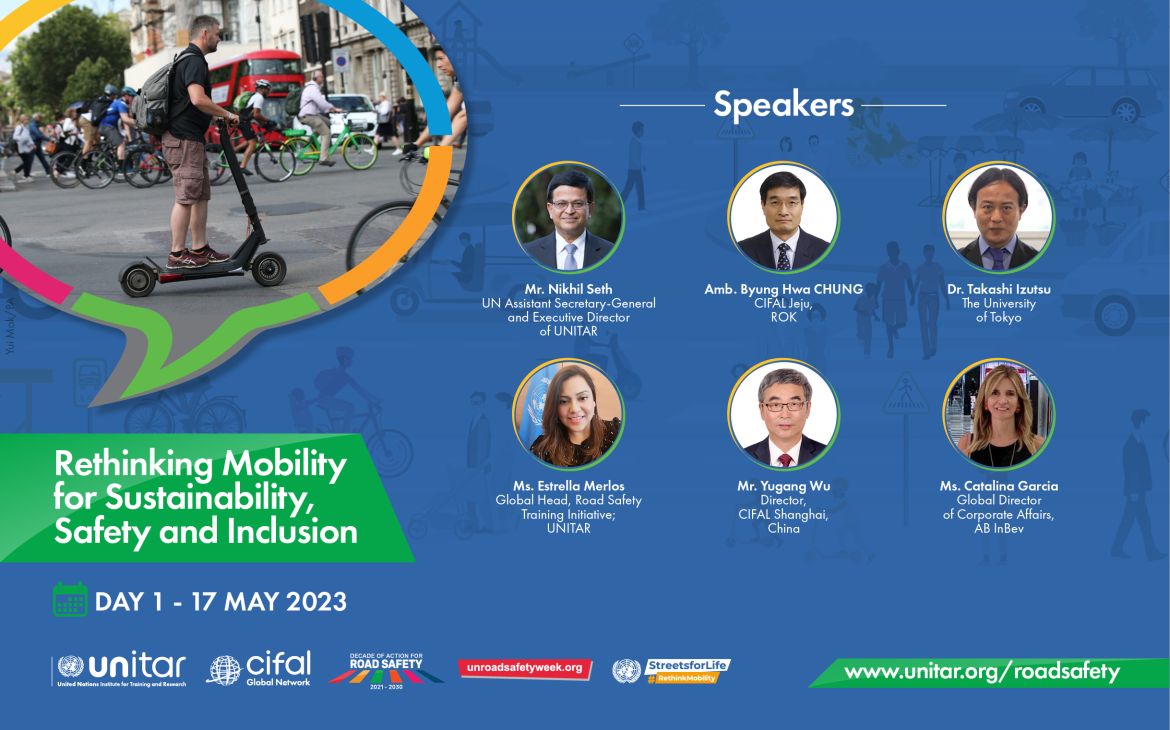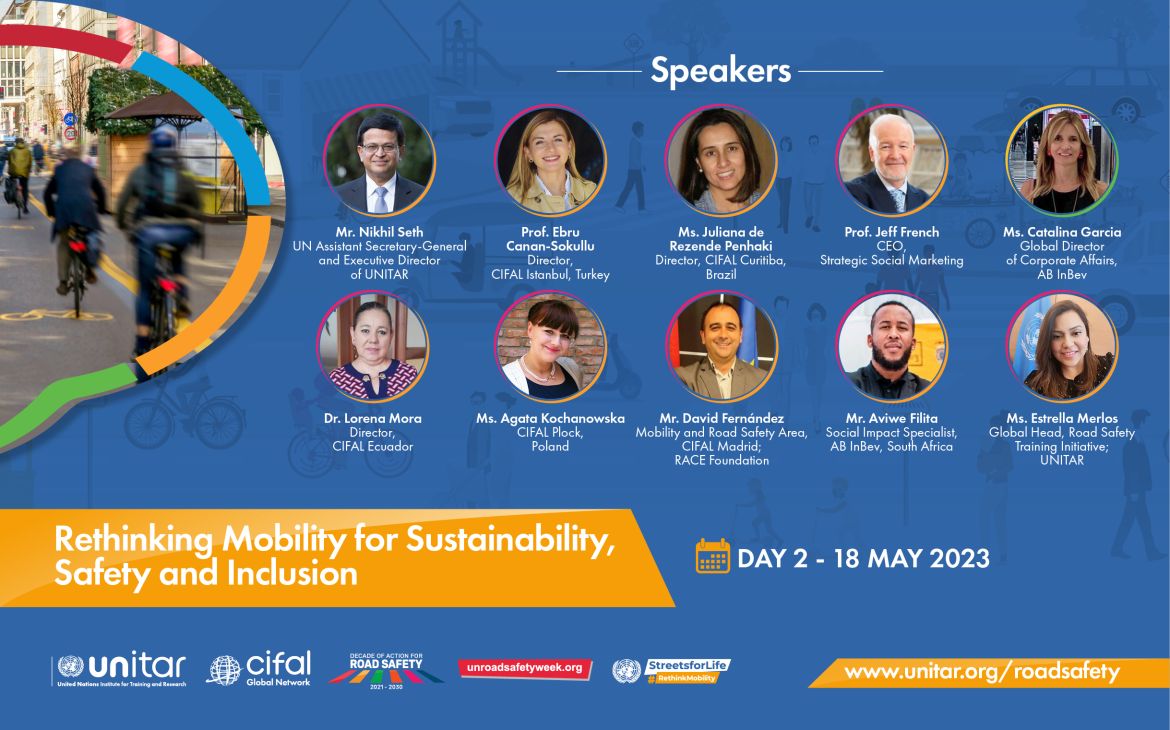24 May 2023, Geneva, Switzerland - The United Nations marked the 7th UN Road Safety Week from 15 May to 21, 2023, to raise awareness about the urgent need to continue to promote road safety and save lives. Road traffic deaths and injuries remain a global problem, with 1.3 million people dying and over 50 million people injured each year. Globally, more than 500 children are killed on the road each day (WHO).
In line with the theme of Road Safety Week, “Rethinking Mobility: Sustainability, Safety and Inclusion, UNITAR and its Global Network of CIFAL Training Centres hosted two online dialogues on 17-18 May 2023 bringing together experts, road safety professionals, representatives from academia, public and private sector and civil society to share practical views and examples on how to make our cities safer, sustainable and inclusive. 125 participants from 64 countries across the globe took part in the events.
The dialogues kicked off with remarks from the Executive Director of UNITAR, Mr. Nikhil Seth, who talked about the importance of raising awareness on road safety matters, pointing out that “this Global Road Safety Week under the theme of “Mobility” aims to motivate all of us to rethink the way we move, to place special attention to the needs of children, the elderly and deliver the mobility that communities need.”
The discussions were led by Directors of CIFAL centres including CIFAL Curitiba (Brazil), CIFAL Ecuador, CIFAL Istanbul (Turkey), CIFAL Jeju (Republic of Korea), CIFAL Madrid (Spain), CIFAL Plock (Poland), and CIFAL Shanghai (China). Experts from the University of Tokyo and Strategic Social Marketing, as well as representatives from AB InBev Brazil, India, South Africa and the USA, took part in the discussions.
Amb. Byung Hwa Chung, Director of CIFAL Jeju shared some views on the importance of e-mobility in raising awareness on climate change. He addressed the issue of transportation which contributes to 23%-25% of the total global CO2 emissions. As part of their ongoing work, CIFAL Jeju contributes to building capacity for e-mobility in Asia Pacific countries to inform people about taking action for sustainability.
Mr. Yugang Wu, Director of CIFAL Shanghai, China also shared his expertise on the future of mobility in Shanghai. He explained the current situation and shared about future projects to improve mobility in Shanghai City, including the development of smart highways and subway lines. By the end of 2025, Shanghai city plans to have 760’000 charging stations, 300 replaced power stations, 70 hydrogen refuelling stations and 1.2 million new energy vehicles.
Ms. Amrita Sarna, Senior Manager, Corporate Affairs, AB InBev India stressed the necessity of road safety in India and reducing fatalities and accidents. Ms. Sarna mentioned that the different interventions in India are spread across the ‘5Es programme’ and aim to reduce by half the number of fatalities and injuries in cities such as Gurugram by 2030. To respond to this challenge, AB InBev is creating new value from its ecosystem and is utilizing its diverse partnerships, especially with the government.
Moreover, Dr. Takashi Izutsu from the University of Tokyo stressed the necessity of “Designing roads for all, a perspective on Inclusion”. Dr. Izutsu shared the need to adapt the roads for people with disabilities. “We need to address social barriers and not to force changes in persons with disabilities, but to change the society through removing social barriers,” he highlighted.
Ms. Estrella Merlos, Global Head of UNITAR’s Road Safety Training Initiative presented the “Management Practices for Safer Roads Toolkit”, an interactive e-learning tool that helps assess locations where road traffic crashes happen most often and identify corrective measures to reduce the number of fatalities and injuries in such locations. The toolkit is free and available in 10 languages.
Throughout the webinar, speakers highlighted the need for a comprehensive approach to road safety that includes education and enforcement interventions, emphasizing the importance of engaging all stakeholders, including governments, private sector actors, and individuals, in efforts to improve road safety.
For example, Ms. Catalina Garcia, Global Director of Corporate Affairs in AB InBev called attention to the need for a multi-stakeholder approach to improve road safety. "It remains a pressing global concern, and efforts to improve the road conditions to ensure the safety for the future generation of young leaders is essential,” she stressed.
Ms. Juliana de Rezende Penhaki, Director of CIFAL Curitiba, Brazil mentioned the different projects on road safety called “Curitiba 2035”. This includes quiet areas in the city centre, public transportation fleet with less polluting vehicles. Ms. Penhaki highlights the need for public partnership for the development of actions and urbanization. She pointed out that “the future of mobility brings the reflection that hardly any organization will be able to face this change alone”.
Dr. Lorena Mora, Director of CIFAL Ecuador shared about the national plan and the importance of having more sustainable cities by improving green mobility. Dr. Mora mentioned the need of providing capacity-building workshops and work on guidelines that include civil society in road safety projects. She also highlights the necessity of inclusion in mobility by having inclusive cities. To respond to these challenges, Dr. Mora mentioned the importance of collaborating with transport and infrastructure-related ministries and with Road Safety agencies.
Mr. Lucas Lima Do Nascimento Leandro from AB InBev Brazil shared the results of road safety interventions in São Paulo using technology and artificial intelligence to predict road traffic crashes. Their work resulted in an 11% reduction in fatalities in São Paulo in the first year and a 41% reduction in Brasilia from 2017 to 2021 which prevented 525 deaths.
Mr. David Fernández, Mobility and Road Safety Area Manager of CIFAL Madrid and the RACE Foundation, discussed the actions that can be taken to protect the most vulnerable users. He highlighted the inclusion and empowerment of pedestrians in newer sustainable modes of mobility, such as bicycles and electric vehicles, while also stressing the importance of considering vulnerable groups, such as children and the elderly, in road safety. CIFAL Madrid has developed guidelines to ensure that children are travelling safely to and from schools.
Ms. Agata Kochanowska of CIFAL Plock, Poland shared about sustainable and safe transportation in the city of Plock. She mentioned Plock’s comprehensive plans and local laws that support sustainable development and transportation. Specifically, the city of Plock has implemented the Sustainable Urban Mobility Plan, which focuses on a bicycle paths system, public transport, electric vehicles, and education and promotional campaigns. The city of Plock has developed and improved its transportation infrastructure over the past few years, notably expanding its city bike availability and public transportation services to increase user-friendliness.
Professor Ebru Canan-Sokullu, Director of CIFAL Istanbul, gave insight into the road safety situation in Turkey. Today, about 73% of road crash fatalities and injuries occur within the economically productive age group, between 15 and 64 years of age. While some improvements have been made, "road safety is a significantly important topic for Turkey" still, as Professor Canan-Sokullu states. Some of the key action items for the country are outlined in the Road Traffic Safety Action Plan, which was adopted in 2021, and includes priority areas in combatting excessive speeding, protecting vulnerable road users, and effective enforcement. Finally, Professor Canan-Sokullu emphasizes that sustainable road safety is indeed achievable, "provided that a legal and regulatory framework is internalized by all the local and national agencies...and we need more and more transparent data."
Mr. Aviwe Filita, Social Impact Specialist, AB InBev in South Africa shared the challenges that South African authorities are facing to prevent drink-driving and the role Evidence Alcohol centres have in increasing drink-driving arrests and the rate of prosecutions. They put together “Evidential Breath Alcohol Tests, EBAT” to reduce the long periods between alcohol volume testing and prosecution of road injuries and deaths. Mr. Filita mentioned that the most effective channel to deter drink-driving in South Africa is enforcement.
Professor Jeff French, CEO, of Strategic Social Marketing presented the social norms approach to rethink mobility and mentioned the importance to understand behaviour and how to influence it, as the world faces multiple interconnected complex social, environmental, health and safety challenges. Prof. French said, “Groups are very powerful as they influence the way we think and behave on various matters especially those on Road Safety”.
The dialogues provided an opportunity to share best practices learned from different regions of the world. The CIFAL centres also mentioned the importance of data collection and analysis, the need for targeted interventions that address specific risk factors, and the role of technology in improving road safety.
As we look towards the future, Road Safety will continue to be a critical issue that requires ongoing attention and investment, this includes increasing investments in walking, cycling and using public transport, modes that can contribute to making people healthy, cities sustainable, and societies equitable.
Presentations: The future of mobility - Sustainability
- Amb. Byung Hwa CHUNG, CIFAL Jeju, ROK
- Mr. Yugang Wu, Director, CIFAL Shanghai, China
- Ms. Amrita Sarna, Senior Manager, Corporate Affairs, AB InBev India
- Ms. Juliana de Rezende Penhaki, Director, CIFAL Curitiba, Brazil
- Dr. Lorena Mora, Director, CIFAL Ecuador
- Mr. Lucas Lima Do Nascimento Leandro, AB InBev, Brazil
Presentations: Sustainable and safe transport
- Ms. Agata Kochanowska, CIFAL Plock, Poland
- Prof. Ebru Canan-Sokullu, CIFAL Istanbul, Turkey
- Mr. Aviwe Filita, Social Impact Specialist, AB InBev, South Africa
- Mr. David Fernández, Mobility and Road Safety Area, CIFAL Madrid; RACE Foundation
Presentations: Management practices for Safer Roads Toolkit
- Ms. Estrella Merlos Global Head, Road Safety Training Initiative, UNITAR - Toolkit
- Ms. Catalina Garcia, Global Director of Corporate Affairs, AB InBev
Presentation: Designing roads for the most vulnerable – Inclusion
- Dr. Takashi Izutsu, The University of Tokyo




